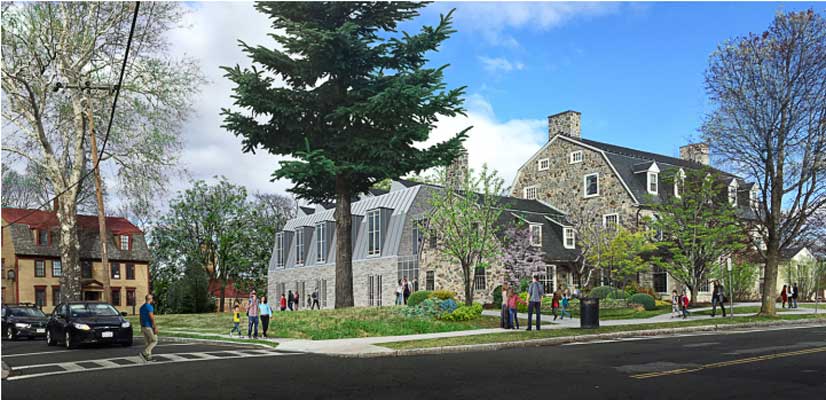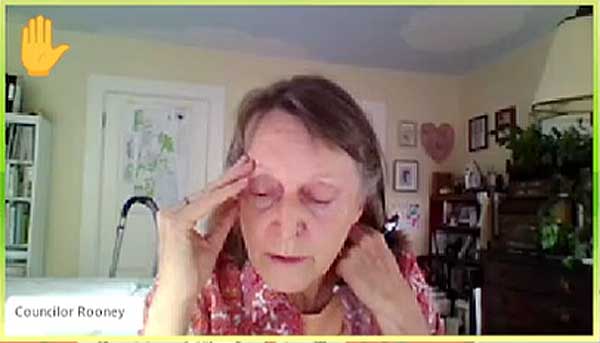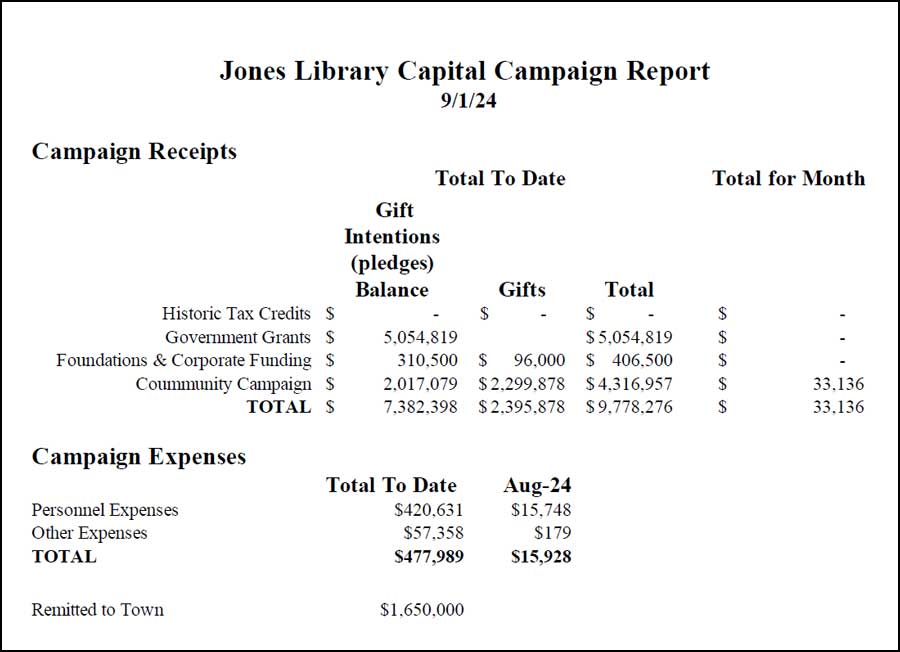No Bidders for Library Swing Space

Photo: https://www.joneslibrary.org/
After a 2-month hiatus the Jones Library Building Committee (JLBC) met on Tuesday, September 17 as it prepares to open rebidding for the estimated $46.1 million library demolition-renovation-expansion project on September 25, according to statements made by Director Sharon Sharry to the Buildings & Facilities Committee earlier in the day.
Town Manager Paul Bockelman rejected a single construction bid in May that exceeded cost estimates by $6.5 million. The Jones Library Board of Trustees subsequently committed $550,700 from their endowment to produce a less costly design that they hope will find a more competitive contractor bidding environment in the fall.
Building contents will need to be packed up and moved to a temporary location capable of supporting library services for 18-24 months while construction is in progress. On August 7, the Town invited proposals for renting a minimum of 17,000 sq. ft. of handicapped accessible space within 20 minutes from Amherst Center. Adequate restrooms and ample parking are also a requirement, and the town must be able to remodel the space if necessary.
Sharry told the JLBC that no bids for temporary space had been received before bidding closed on September 11.
She added that “Somebody has reached out since then and said that they have space available that they would like Bob [OPM Robert Peirent] and I to come and look at.”
JLBC Chair Austin Sarat asked if considering this new offer from a property owner who did not submit a bid would square with the town’s processes which are governed by Massachusetts procurement laws.
“It depends and we’ll have to wait for Bob to come back from vacation to talk about it,” replied Sharry.
Decision-making and Review Procedures Questioned
Town Council representative on the JLBC Pam Rooney expressed concern that recent decisions to alter design specifications had not been reviewed by the entire building committee but were apparently OKed solely by Sarat. The JLBC charge states “All major decisions shall be brought to the JLBC for review, approval, and formal submission to the Library Board of Trustees and Town Manager for final approval, as required.”
Sarat argued that two design changes – dropping bid alternatives for asphalt shingles and window treatment – had been demanded by the Amherst Historical Commission. A third change – backing off a plan to discard all interior millwork – was made, Sarat explained, because “you among others said you wanted it in so we put it back in.”
“I love governance in Amherst […] but it is time consuming,” he added.
Sarat’s description of the historic millwork being “put back in” may be an oversimplification. Before value engineering the design called for the elegant millwork, which represented 18% of the cost of the original building, to be carefully removed so that wiring and plumbing could be run, and then reinstalled. Finegold Alexander Architects explained at the July 17 JLBC meeting that the latest intention is to avoid the reinstallation of millwork by leaving it in place and making cuts where necessary to accommodate wiring and plumbing.
When asked to clarify whether this was in fact the case, Sarat remained silent. Nor has the project team provided evidence that they have communicated this and other recent design changes to the Massachusetts Historical Commission (MHC). MHC evaluation of proposed designs which could adversely affect the historic library is required of grant-supported projects by state and federal law.

Rooney pointed out that going out to bid next week before environmental and Section 106 historic preservation reviews have been completed could be problematic.
“How do we expect to incorporate any of the mitigation measures or other elements that might be necessary in order to comply with the NEH and HUD requirements that make sure we get our [grant] money? Sorry, not our money, their money,” she asked.
Altering construction documents that have been finished and distributed to bidders could prove expensive, she added.
Sarat dismissed her concerns, saying “change orders” which he described as a commonly used mechanism in construction projects would be issued to address necessary design modifications.
Frustrations Bubble Up During Public Comment Period
The final JLBC agenda item was public comment. Despite nearly an hour remaining in the 90 minutes allotted for the meeting, Chair Sarat asked attendees to limit their comments to two minutes rather than the customary three minutes.
Jeff Lee questioned the use of change orders to address mitigation measures. The required changes could be as significant as eliminating or downsizing the 15,000 sq. ft. addition which the MHC has commented is out of scale with respect to the historic building and obstructs its view. He suggested that this would be a substantial change beyond the scope of a change order.
Maria Kopicki asked why the meeting was being held without OPM Bob Peirent and Town Manager Paul Bockelman being present to answer questions. “That is no way to run a multi-million dollar municipal project,” chided Kopicki.
Arlie Gould protested the continued claim by project proponents that two-thirds of the Town supports the project. She pointed out that the referendum on which this claim is based was held three years ago when the project was $10 million cheaper, before several million dollars’ worth of value engineering cuts had been made, and before fundraising fell short of goals. “In essence nobody has voted on this project,” she said.
“Arlie you’re over your time. Please finish up,” interjected Sarat.
Former Jones Library Trustee Sarah McKee commented that going out to bid when changes to the plan are likely will be unfair to contractors and asked how prospective bidders would be notified of this risk.
Rob Kusner described the lack of interest in bidding for the temporary library space as worrisome.
Mickey Rathbun took issue with the Chair’s refusal to respond to comments.
“I’m always amazed at these public comment opportunities where specific questions are raised and then not answered; not even addressed with a sort of promise to get an answer,” she said.
Rathbun criticized a draft Section 106 review timeline which she argued thwarts the ability of consulting parties to offer input before the town identifies adverse effects. She quoted the federal regulation that describes consulting party rights.
“Mickey you are over time. If you would wrap up I’d be grateful,” interrupted Sarat.
“Do you have a response for me?” asked a frustrated Rathbun.
“Thank you so much for coming, Mickey,” continued Sarat.
“I would just like to hear somebody say something in response to my concern. If it’s not clear I would be happy to restate it,” pleaded Rathbun.
Finally Sarat announced, “With gratitude for your interest, gratitude that you’ve come, gratitude for your comments, I’d really be grateful if you would now stop.”
“Public comment is now closed,” he said as he muted Rathbun.
Hilda Greenbaum reported to the Amherst Indy that she joined the virtual meeting after public commenting had begun. Though she raised her virtual hand to speak, Sarat refused to call on her, she said.
The JLBC meeting, which had been announced to run from 5:00 – 6:30 p.m. was adjourned at 5:51 p.m.




You’ve done a public service, Jeff, by reporting on this farce of a “public comment” period. Amherst voters deserve to know just how seriously their elected public officials take the public’s express concerns.
I wanted to ask the Building Committee whether a new Project Notification Form had been submitted or are contractors bidding on the original one which, from what I can tell from what I learn at so-called public meetings, the Value Engineered plan pretty much only affects exterior landscaping , removal of stone benches, children’s play area, and the like that can be installed at a later time.
The original PNF calls for an illegal and radical change to the floor plan and change of use of the original spaces. The result is the removal of 1928 extinct Philippine walnut and Philippine mahogany carved walls, door frames, staircases, made of the finest materials and craftsmanship, of a quality also no longer available at any price. Professor Austin Sarat J.D. states that he and The Director decided that in response to public comment the interior millwork will not be destroyed. I’m confused! It sounds like more obfuscation: having your cake and eat it too.
As far as I can tell, the original PNF is operative and the reconstruction of the interior as proposed will not be in compliance with State and Federal law. This proposed building is ugly and out of scale with the abutting historic properties. The architects say that this design is understated so as not to detract from the historic stone building. I and many others disagree! Just look at the bank across the street. Future generations shouldn’t have to suffer the aesthetic and economic consequences of educated people having chosen the wrong architects yet again!
With no proposals submitted during the first Request for Proposals process a new RFP must be issued for the swing space if the cost is going to be more than $35,000 in total. If the the space the was offered after the deadline does not meet all of the requirements of the original RFP the second RFP can change the reqirements and all interested property owners will have the
advantage of that change.
If Robert Peirent is not back from vacation yet the good folks at the Mass. Office of the Inspector General are super helpful answering questions from local officials and they are the experts on the Mass. laws covering municipal property leases, Chapter 30B. They’d much rather help cities and towns get things right than investigate reports of violations.
Since this article also mentions Austin Sarat’s assertion that change orders will be used to implement the historical element changes he has decided are acceptable I will repeat an earlier comment on another article. The Office of the Attorney General has stated quite forcefully that change orders cannot be used to implement changes the need for which was discovered after a project was bid but before a construction contract is signed . Anything that reduces the planned destruction of the historic jewel in our downtown crown has my vote but, since no contract has been signed yet, there is a legal way to do this, rebidding, and an illegal way to do this, change orders.
Has a new Request for Proposals process been started for the Library swing space?
I just checked the Bid Posting page on the town’s website (https://amherstma.gov/bids.aspx) and there is still nothing there for the library temporary space. Nothing about a new RFP has been mentioned at recent library related meetings.
Might the Library Trustees be thinking/planning to sign a lease without the required publicly advertised process?
This would ordinarily be a shocking question to ask but they have shown a marked tendency to ignore required processes recently.
The thinking may be that if only Library funds are used for lease payments the public Request for Proposal process does not apply. Since the Library has failed to raise the funds it committed to raise for the project and any lease payments by the Library will increase the size of the bag the Town is left holding I don’t think they have made a defensible call, if this is what’s going on. Call the Office of the Inspector General? An interesting question.
If the Town is not going to pick up the slack in funding caused by the fundraising failure then we have no problem.